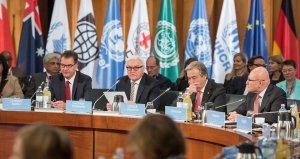News from Berlin
Berlin Conference on the Syrian Refugee Situation
October 28th, 2014
News from Berlin – In the Middle East’s largest crisis region, millions of people have been forced to flee their homes – the UN’s refugee agency UNHCR estimates that more than three million Syrians have fled to neighbouring countries since the inception of civil war in 2011, while an additional six and a half million have been internally displaced within the country. Amongst the affected individuals, it is believed that there are more than six million children, a redoubtable number given the imminent approach of winter and the concurrent humanitarian issues within refugee camps.
This morning, representatives from more than forty countries and international organizations met in Berlin in order to discuss the Syrian refugee situation, as a means of shedding more light on a part of the world that remains in desperate need of political and humanitarian aid. The delegates met at the invitation of Gerd Müller, Antonio Guterres (United Nations High Commissioner for Refugees) and Frank-Walter Steinmeier (German Foreign Minister).
The majority of the refugees are being hosted in neighbouring Lebanon, Jordan, Turkey, Iraq and Egypt, and the aid that these countries are providing is causing real strain on national infrastructure. This morning’s conference insisted on the fundamental contribution of these countries, yet the general consensus was that the humanitarian aid – although remarkable – remains clearly disproportionate to the scale of the crisis. The impact is especially dramatic for children, who not only lose their homes, but also their emotional and financial security, and effectively their hopes for the future. In order to prevent them from turning into a lost generation, UNICEF’s Maria Calivis insists that sending refugee children to school must be made a priority, as three million Syrian children currently lack access to education.
This, however, entails its own problems, as national infrastructure is being overwhelmed in the host countries, creating economic hardship where food, water and energy resources are being stretched. Jordan, for example, has generously taken in roughly a third of all Syrian refugees, but Jordan’s own economic instability prevents it from effectively catering for all the needs of its burgeoning population. According to aid groups, the humanitarian response to wars in Iraq and Syria still remains woefully underfinanced. Lebanon, for example – which is a country with a population of only four million – has taken in one million Syrian refugees, and lacks the requisite infrastructure in order to take care of them without external aid. Turkey has taken in 1.6 million refugees, of which roughly half are children, but providing education to this vulnerable new demographic is a task that is proving largely insurmountable. The country has extraordinarily spent $4 billion on humanitarian aid, while only receiving $250 million in return from the international community.
All of this indicates a drastic need for external aid in order to alleviate the pressure on both the refugees and their host countries. The UNHCR has calculated that a total of 3.75 billion dollars are needed in order to effectively address the refugee situation, and thus Antonio Guterres’ admission at this morning’s conference that there is a “need for a much stronger commitment to burden sharing” should be viewed as morally imperative. The predominant narrative of the conference outlined the need for a new approach, as Guterres insisted that “it is not with a bureaucratic approach that the situation can be turned around”. Rather, the emphasis was placed on the “continuing gravity of the situation”, and the hitherto ineffectiveness of humanitarian and military action. It was widely suggested that the solution to the humanitarian crisis should be political; that the time has come for political leaders to put aside their differences, come together, and plan the necessary political solution to the humanitarian crisis. A holistic approach was also proposed, which would crucially help alleviate pressure on neighbouring countries “who have had to shoulder an unfair share of the burden”.
It remains to be seen whether this morning’s conference will have a tangible effect on the resolution of the Syrian refugee crisis, but the determination of the international community to discuss the issue is a promising sign. Representatives from the organizations tending to the region’s refugees have stated their wish for a clear political signal to come out of the conference in Berlin, and the conference did admittedly insist on the necessity of a unified political response to the humanitarian crisis. Encouragingly, Angela Merkel was keen to emphasise that the conference “is not to be understood as a mere meeting of donors, but as a show of political support”, before the German Chancellor met on Monday evening in Berlin with Lebanese Prime Minister Tammam Salam.
News from Berlin - Berlin Global





